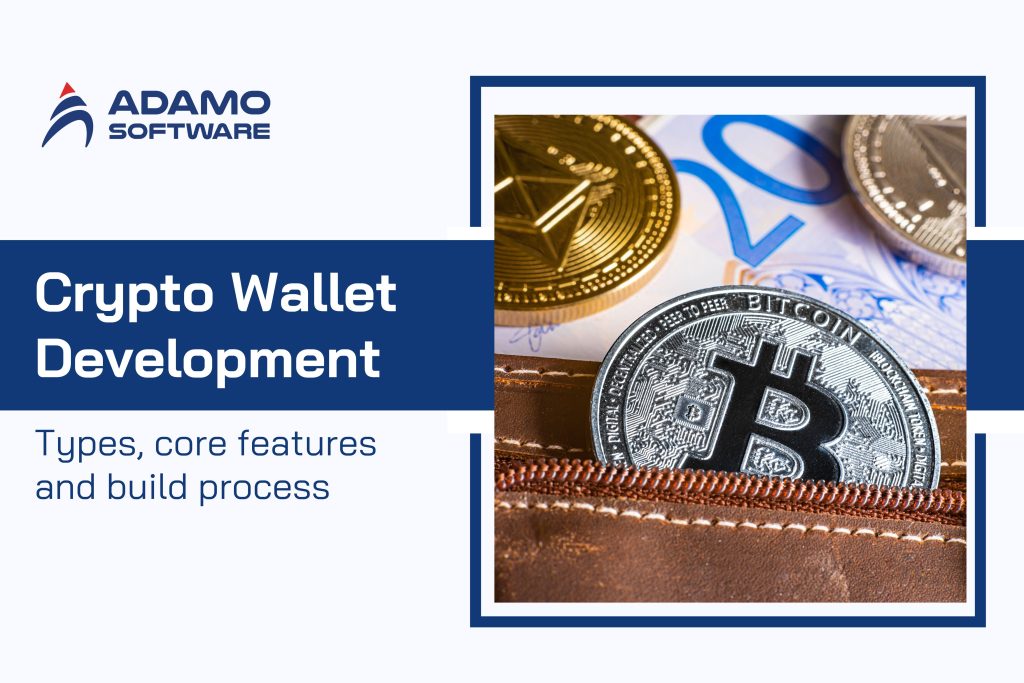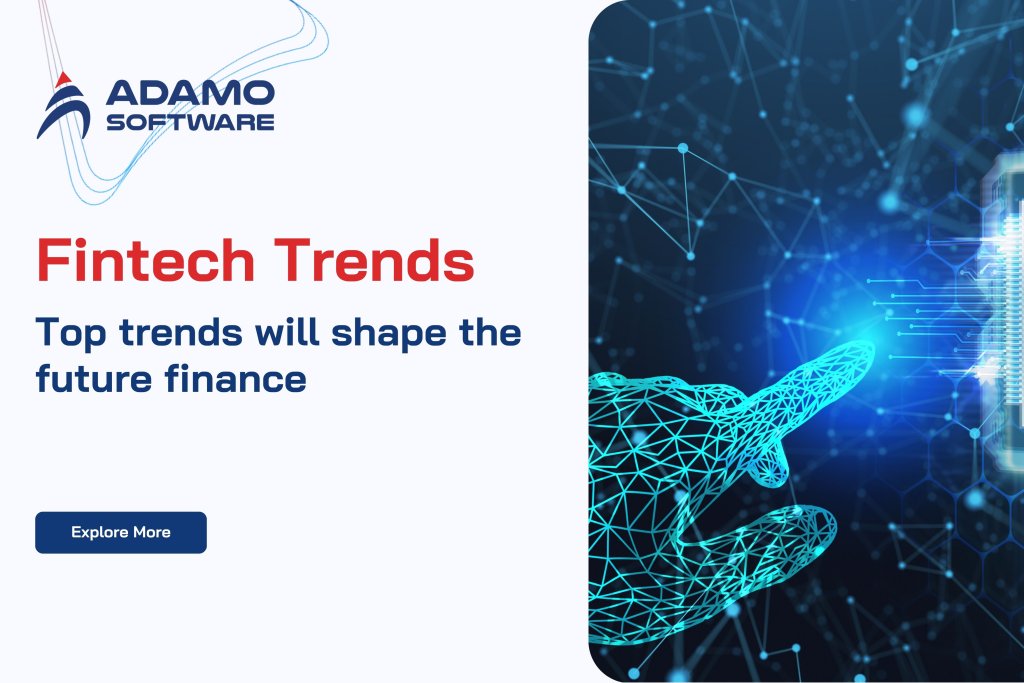Extensive guide on Blockchain-based Security Solution for IoT Systems
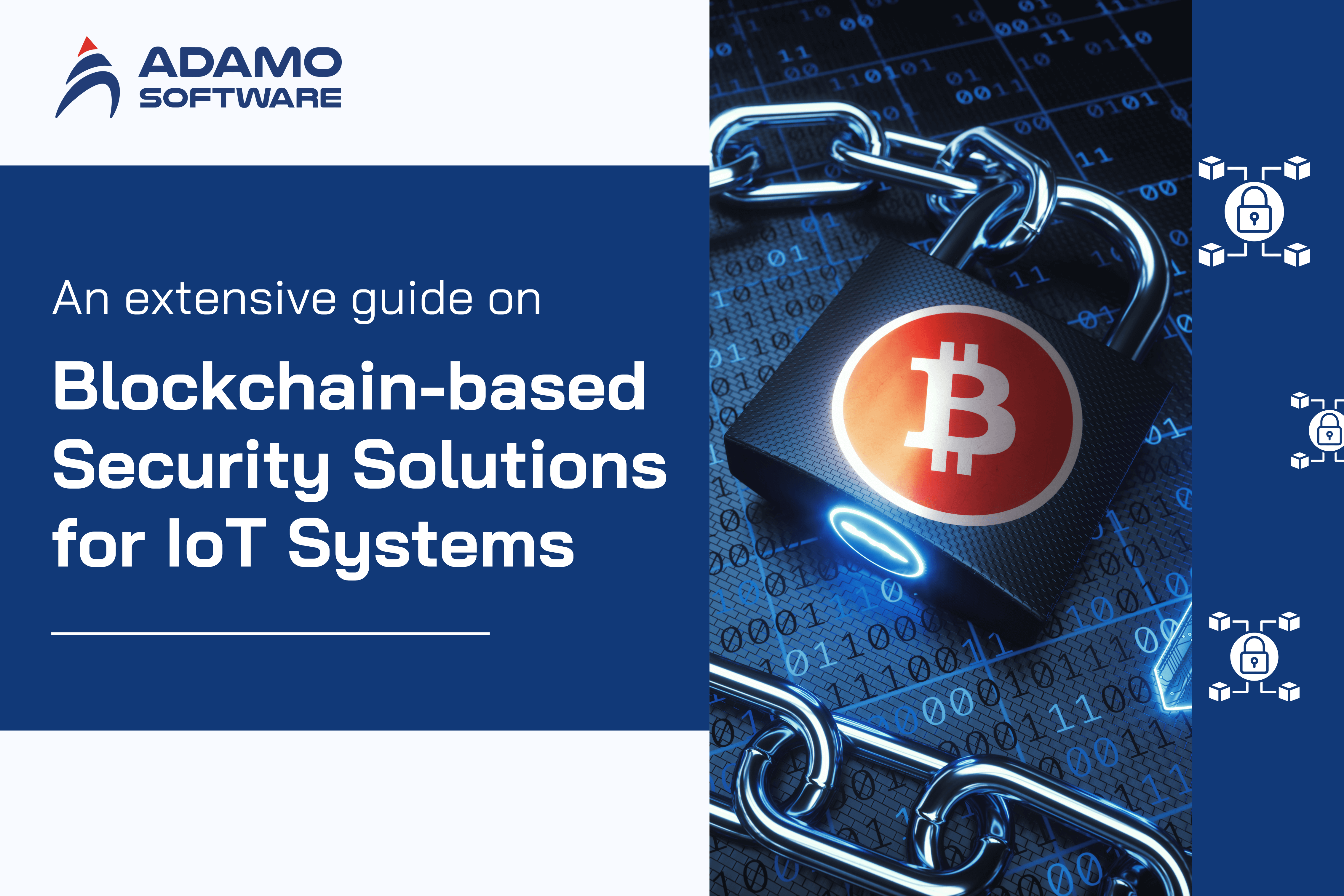
In today’s digital age, Blockchain is one of the breakthrough technologies that have a strong impact on many areas of life. Thanks to complex algorithms and high security, this technology can disable editing interference to data information, creating transparency for users.
Blockchain-based security solutions for IoT (Internet of Things) systems help address security challenges. With the ability to record and store data transparently, Blockchain can authenticate, encrypt, and protect data from IoT devices. This helps to enhance security, optimize management capabilities, and minimize risks from cyber-attacks. Let Adamo Software discuss this security solution in more detail.
Through this blog post, you will get more insights into blockchain-based security solutions for IoT systems and the advantages of integrating blockchain into the IoT. Besides, its drawbacks are also discussed. Additionally, Adamo also provides you with some use cases of blockchain-based security solutions for IoT systems and estimated costs of implementing blockchain for IoT security. All information has been thoroughly researched and updated to the latest trends. So, let’s read our post and find some useful information for you!
I. What is a blockchain-based security solution for IoT systems?
Blockchain-based security solutions for IoT systems are advanced technologies that help users deal with challenges in the IoT environment, where millions of devices are connected and exchange information. Security is always a major issue in the IoT due to the dependence on traditional intermediary networks that are vulnerable to attacks.
Thanks to blockchain, the need to rely on intermediary servers can be eliminated. This technology can distribute data across multiple network nodes, reducing the risk of attacks and creating a more secure system. Besides, blockchain also supports the authentication of IoT devices, encryption of transmitted data, and effective access management.
A blockchain-based cybersecurity platform can secure connected devices by using digital signatures to identify and authenticate them. The devices then act as authorized participants in the blockchain network. Each authenticated device that joins a blockchain-based secure IoT network is considered a participating entity, just like in a regular blockchain network. All communications between verified participants (IoT devices) are cryptographically secured and stored in tamper-proof logs.
Every new device added to the network is registered by assigning a unique digital ID on the Blockchain system. This platform will provide secure channels for communication between devices and all connected devices will have secure access to the host system or infrastructure simultaneously. Blockchain-based cybersecurity solutions can also leverage Software-defined perimeter (SDP) architecture and use a Zero-Trust model to make all authenticated devices invisible to attackers. This means that only authenticated devices can know about the existence of other connected devices, thereby adding a layer of security to the IoT infrastructure.
Additionally, blockchain-based security solutions for IoT systems can also detect and prevent tampering or data breaches. Any changes to the Blockchain chain require consensus from all participating nodes in the network. Therefore, the risk of hacking or unauthorized changes to the information can be minimized. This is especially important in sensitive IoT applications such as healthcare, smart transportation, or automated factories.
II. Advantages of integrating blockchain into the IoT
Integrating blockchain into the IoT offers significant benefits in improving security, transparency, and data management efficiency. Along with the robust development of IoT, devices are becoming increasingly vulnerable to attacks and security vulnerabilities are increasing. Blockchain provides an ideal solution to overcome these challenges, thanks to its ability to decentralize data and protect information from cyberattacks. Let Adamo Software discuss the advantages of blockchain-based security solutions for IoT systems in more detail.
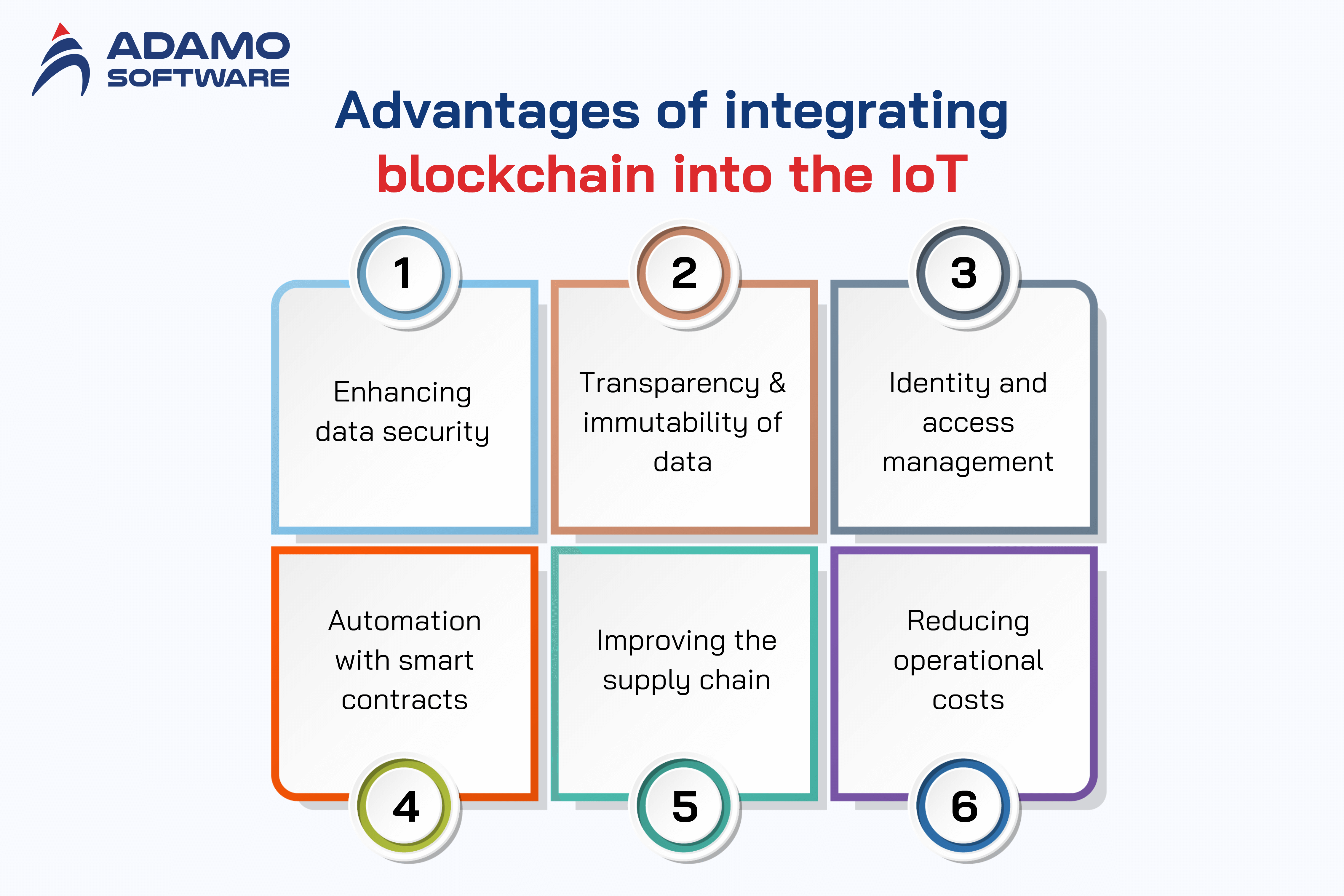
1. Enhancing data security
Firstly, blockchain-based security solutions for IoT systems help to enhance data security. This helps to protect devices from vulnerabilities when transmitting data through intermediate networks. By storing information on the blockchain, you can ensure that no third party can easily interfere, change, or hack the data.
2. Transparency and immutability of data
The next advantage of blockchain-based security solutions for IoT systems is their transparency and immutability of data. All transactions and interactions between IoT devices are recorded on blockchain systems, which makes blockchain-based security solutions for IoT systems. Changes can only be made with consensus from the entire system, ensuring the accuracy and integrity of data throughout the operation.
3. Identity and access management
Blockchain-based security solutions for IoT systems can manage identity and access rights. Blockchain can help securely authenticate the identities of IoT devices, minimizing the risk of spoofing or attacks from unauthenticated devices. Additionally, access systems are better managed, allowing for tight control over which devices can access important data.
4. Automation with smart contracts
Another advantage of blockchain-based security solutions for IoT systems is their ability to automate with smart contracts. This means that devices can perform transactions or exchange data automatically when pre-defined conditions are met, without human intervention.
5. Improving the supply chain
Integrating blockchain into the IoT systems can help you improve the supply chain by tracking and monitoring goods in real-time. All information about the location, status, and condition of products are stored on the Blockchain in a transparent and immutable manner. This helps you manage the entire product supply process from production to delivery. Thanks to this, you can ensure transparency in the supply chain and minimize the risk of counterfeit and substandard goods.
6. Reducing operational costs
Thanks to automation and transparency, blockchain-based security solutions for IoT systems can help you minimize operational costs. When you use blockchain technology, authentication, data exchange, and transactions between IoT devices can be automated through smart contracts, minimizing human intervention and intermediaries. This speeds up processing and reduces errors and costs associated with system management, maintenance, and security.
Thanks to the mechanism of distributing data across multiple network nodes, Blockchain also eliminates the need to invest in expensive central servers, helping businesses save on infrastructure costs.
Overall, integrating blockchain into IoT systems brings many outstanding benefits. This is a potential solution for the future as IoT continues to expand and security requirements become more important than ever.
III. Challenges of applying blockchain security for the IoT
Under the pressure of increasing cybercrime, IoT security will be a major challenge for any business that issues and uses IoT devices. Let’s explore some challenges of applying blockchain security for the IoT with Adamo Software!
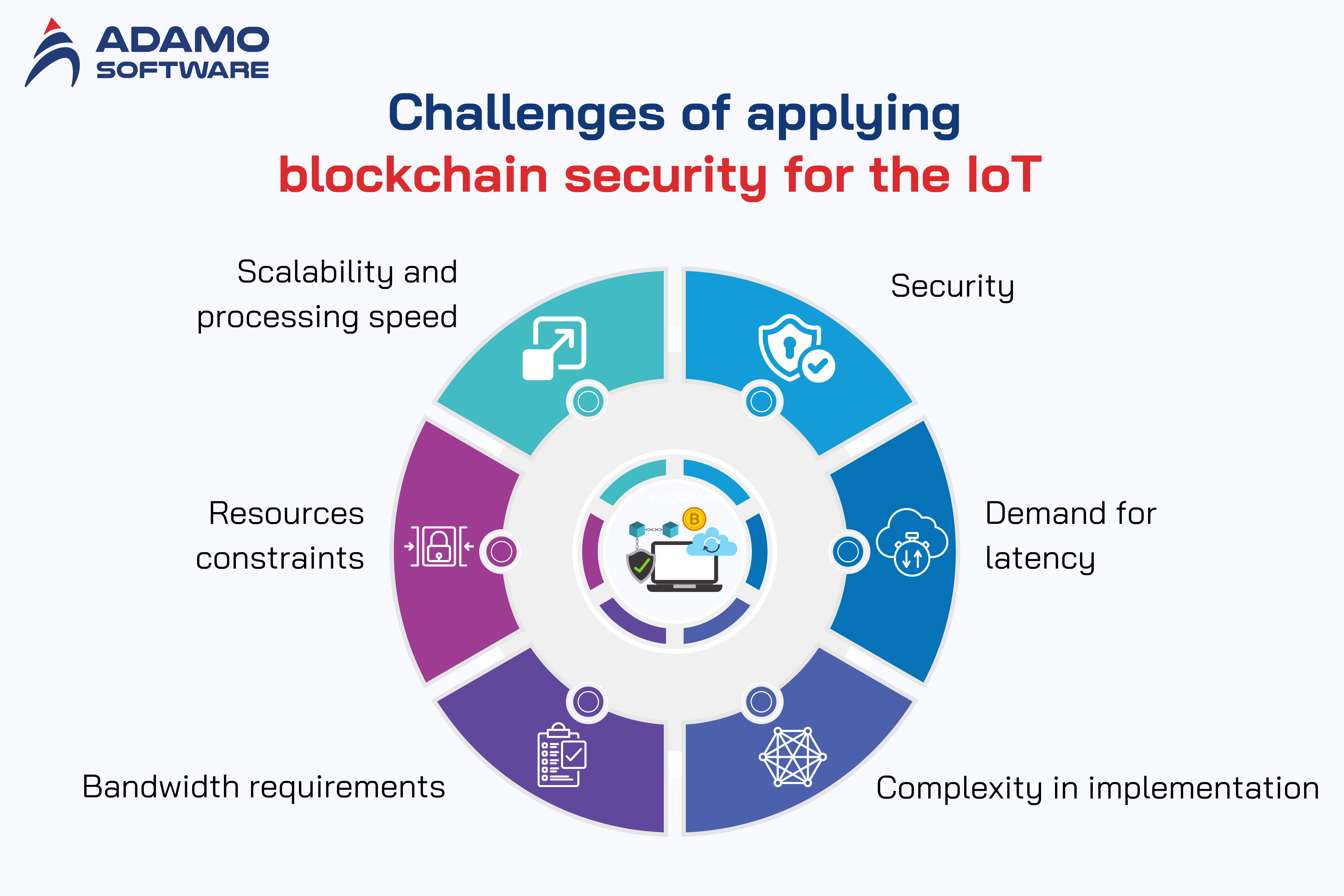
1. Scalability and processing speed
One of the most notable challenges of using blockchain-based security solutions for IoT Systems is the scalability and processing speed. Blockchain systems often struggle with scalability, especially as the amount of data from IoT devices increases rapidly. They must take time to process and confirm transactions, leading to delays in data transmission between devices. This can impact IoT applications that require real-time data processing.
2. Resources constraints
Most of the available IoT platforms have limited communication resources. A blockchain system requires superior memory and storage resources for efficient implementation. An IoT device with limited memory and low power cannot handle heavy blockchain technology.
3. Bandwidth requirements
Another drawback when adopting blockchain-based security solutions for IoT systems is the bandwidth requirements. End devices in IoT architectures typically have quite limited bandwidth. Therefore, this type of processing is not easily available at the end device layer, which can hinder blockchain implementation. Limited bandwidth can also slow down transaction processing, affecting system response times, especially for IoT applications that require real-time data transmission.
4. Security
Although blockchain-based security solutions for IoT systems have high security due to data decentralization and encryption, there are still some challenges in security. Devices in IoT systems communicate and coordinate through a predefined protocol. Therefore, IoT devices must be constantly active, which can make them vulnerable to security threats.
Additionally, the management of encryption keys in Blockchain is also a major issue. If private keys are stolen or lost, there is no way to recover them or prevent attackers from accessing data or devices. This is especially dangerous in small Blockchain networks.
5. Demand for latency
One of the major challenges in implementing blockchain-based security solutions for IoT systems is the latency requirement in data transmission and processing. The advent of blockchain technology may limit the data aggregation rights of consumers. Blockchain with its decentralized nature and authentication mechanism requires many network nodes to participate in consensus, resulting in longer transaction processing times than traditional centralized systems. Therefore, it cannot be applied in time-sensitive IoT applications.
To overcome this problem, blockchain solutions for IoT need to develop new protocols. They can be fast consensus methods or off-chain scaling solutions, minimizing transaction processing latency.
6. Complexity in implementation
Integrating blockchain into an IoT system requires a major change in the structure and operation of the current system. This not only requires extensive knowledge of both technologies but also requires synchronization between devices and networks. The implementation process is complex and requires time and cost to develop and upgrade the system.
In short, block-based security solutions for IoT systems bring many challenges. You must find ways to deal with them to ensure IoT systems can operate efficiently and securely when applying Blockchain technology.
IV. Use cases of blockchain-based security solutions for IoT systems
With its decentralized nature, Blockchain creates a strong security layer for IoT devices in various fields. They can be supply chain and logistics, healthcare, energy, etc. healthcare, energy. Let’s explore some of the most outstanding use cases of blockchain-based security solutions for IoT systems with Adamo Software!
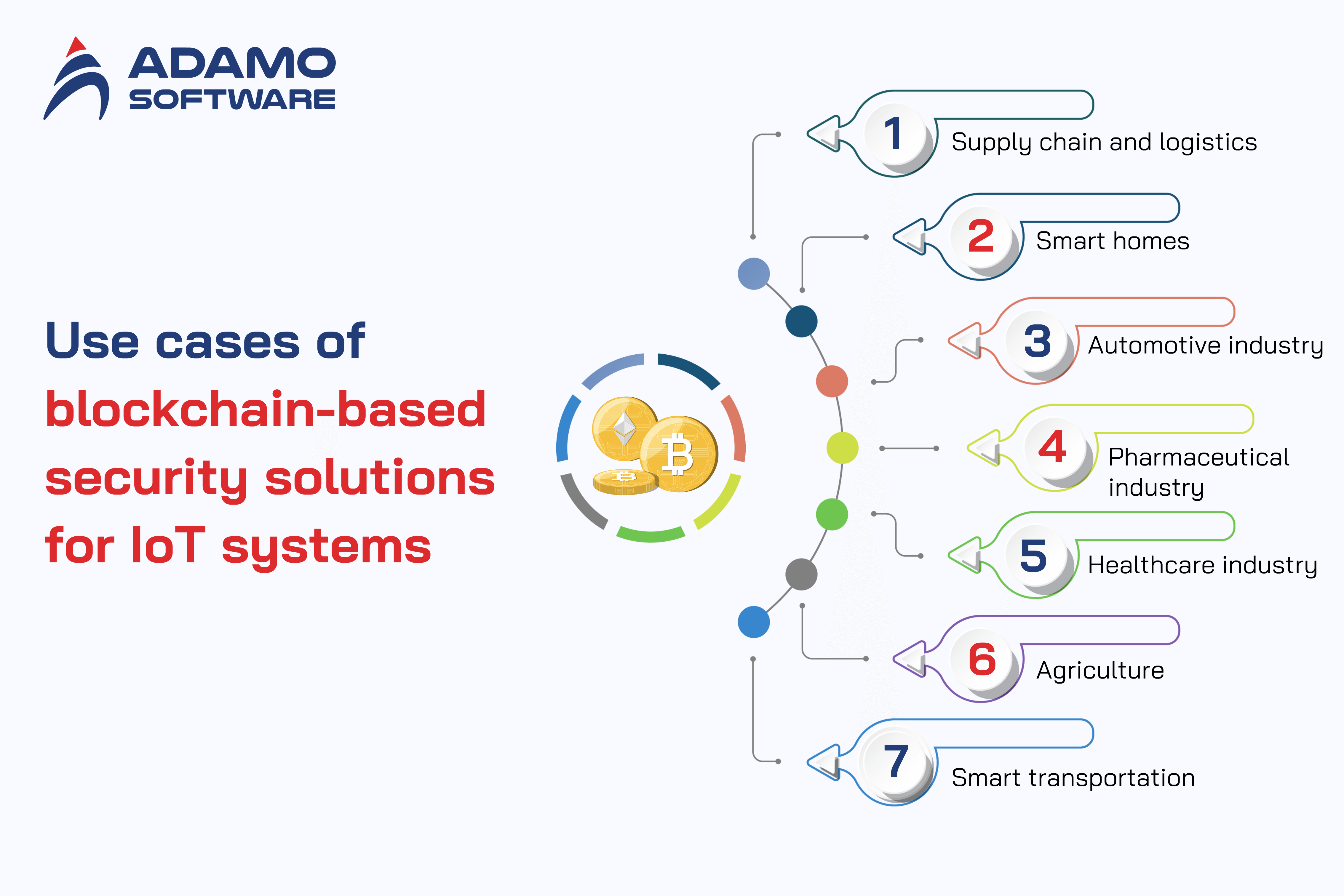
1. Supply chain and logistics
The supply chain system involves various stakeholders such as raw material suppliers, retailers, brokers, etc. It also involves multiple receipts and invoices. The duration of a supply chain can span days and months. Delays in delivery schedules can be a serious challenge. Therefore, companies are pushing IoT applications to track the location and shipping process in real-time.
Integrating blockchain technology in IoT system security helps to improve the traceability and reliability of the network. Information is collected through sensors and stored in the blockchain. Different IoT sensors such as GPS tracking sensors, PIR motion sensors, RFID chips, and temperature sensors collect data from logistics vehicles and provide accurate details about the shipment status.
The information collected from various sensors is then stored in the blockchain and all new actions are recorded. Therefore, the stakeholders cannot tamper with the data, making the supply chain system transparent and trustworthy.
2. Smart homes
Smart homes are also among the cases where blockchain-based security solutions for IoT systems are used. Most smart home applications like room authentication access systems, intrusion detection, remote control devices, and systems require personal details like fingerprint biometrics, facial recognition, voice recognition, etc. All these data are stored in a centralized database which can be more vulnerable to security threats. This can be solved by using blockchain technology.
3. Automotive industry
IoT is increasingly being applied to the automotive industry, especially with smart parking using e-wallets. The time a car is parked in a particular location is automatically estimated and deducted from the e-wallet remotely. Integrating blockchain technology in this process helps to increase the trust of the end user.
4. Pharmaceutical industry
You can adopt blockchain-based security solutions for IoT systems in the pharmaceutical Industry. The problem of counterfeit drugs in the pharmaceutical industry is becoming a worldwide concern. A pharmaceutical company is usually responsible for the entire process of research, development, manufacturing, and distribution of drugs. Therefore, tracking the entire process of transporting drugs to customers is not an easy task. The tracking and transparency features of blockchain technology enable them to remotely manage and monitor the transportation of drugs from the manufacturing plant to the desired location.
5. Healthcare industry
In healthcare, blockchain can protect sensitive patient information and ensure that only those with access can view or change the data. IoT devices, such as health monitors, can record and send data about a patient’s health status. This information will be encrypted and stored on the Blockchain, allowing doctors and hospitals to access the information securely and quickly while protecting patient privacy.
6. Agriculture
Farmers can deploy various sensors in their farm fields. All data is stored in a block and distributed among farmers, buyers, and consumers. By tracking data through blockchain, farmers can take appropriate measures to increase productivity, while consumers can decide whether to buy the crop or not based on data analysis. In addition to the above areas, integrated IoT blockchain systems are used in land management processes, stock markets, toll stations, online vehicle tracking, etc.
7. Smart Transportation
Smart transportation is also among the cases in which blockchain-based security solutions for IoT systems are used. Blockchain can support the management of data from autonomous vehicles and other IoT devices. Information about location, traffic status, and related events will be securely stored on Blockchain, helping to improve decision-making and optimize travel routes. Furthermore, data sharing between vehicles will become more transparent and secure, reducing the risk of accidents and improving traffic safety.
Overall, the above use cases are just a few of the many potential applications of blockchain-based security solutions for IoT systems. Together with the development of technology, more and more areas will benefit from this combination.
V. Cost estimation of implementing blockchain for IoT security
Implementing blockchain-based security solutions for IoT systems involves various costs. These costs can range from hundreds of thousands to millions, depending on the project scale. To assess the feasibility of a Blockchain for IoT project, businesses need to understand the cost factors involved. These costs include initial development costs, maintenance costs, and training costs. Let’s delve into each cost with Adamo Software.
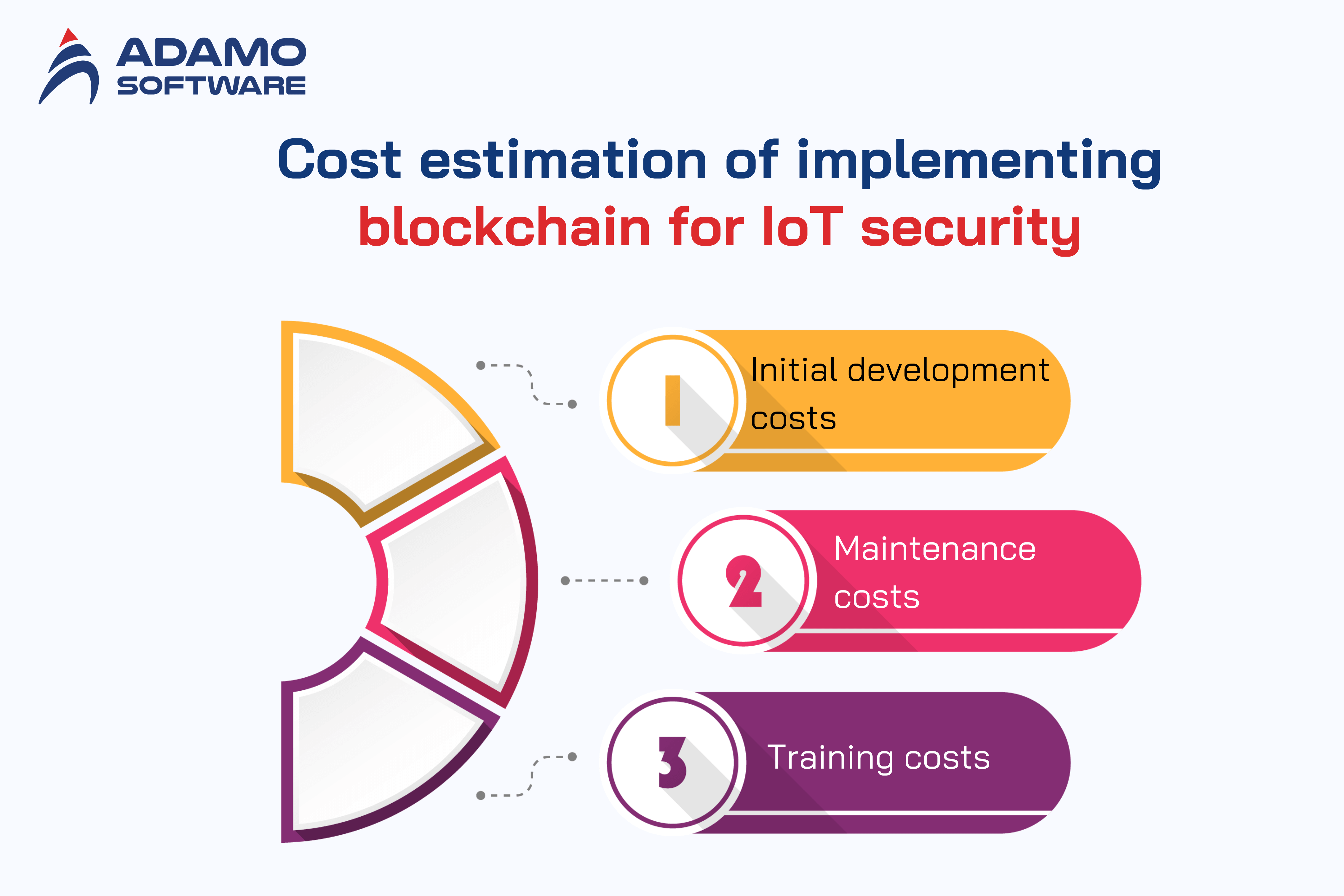
1. Initial development costs
Initial development cost is one of the important factors in implementing blockchain-based security solutions for IoT systems. Firstly, you must invest in research and design, which may include hiring Blockchain and IoT consultants to determine the requirements and solutions that fit their specific needs. Once you have already identified the design, software development costs will arise, including programming, testing, and deploying the software.
Depending on the complexity and scale of the solution, this cost can range from a few thousand to millions of dollars. In addition, businesses need to calculate infrastructure costs, including investments in servers, networks, and IoT devices needed to operate the system.
2. Maintenance costs
Maintenance costs are indispensable in the overall costs of developing blockchain-based security solutions for IoT systems. Once the system is deployed, businesses need to invest in daily operating costs. These costs include electricity, network bandwidth, and management personnel, ensuring the system operates continuously and efficiently. This may include monitoring the performance of IoT devices, maintaining infrastructure, and handling technical issues.
Additionally, businesses must focus on upgrading the system. Blockchain and IoT solutions often require periodic software updates and hardware replacements to ensure security and performance. Regular security audits are essential to protect data and prevent external threats.
Overall, maintenance and upkeep costs not only affect the operating budget but also determine the effectiveness and sustainability of the Blockchain solution in the IoT environment. Therefore, businesses need to clearly plan and prepare a budget for these costs throughout the life cycle of the system.
3. Training costs
To make the most of blockchain-based security solutions for IoT systems, your employees must be trained on how to use and manage the system. This cost can include courses, instructional materials, and even hiring experts to conduct in-person training sessions.
Training helps employees clearly understand how blockchain systems and IoT devices work. Besides, this is also useful in improving the ability to troubleshoot, maintain the system, and implement necessary security measures.
In general, blockchain-based security solutions for IoT systems require a significant investment. By planning carefully and implementing effectively, you can optimize costs and maximize the benefits that blockchain solutions bring to your IoT systems.
VI. How Adamo Software can help in blockchain-based security solutions for IoT systems
Are you looking for a unit that can help you to integrate blockchain with the IoT systems? If yes, Adamo Software can be your ideal choice. As one of Vietnam’s leading software development companies in technology, Adamo can be your trusted partner. With a team of experienced experts in both Blockchain and IoT fields, Adamo Software can support businesses in deploying advanced security solutions, ensuring the integrity, security, and efficiency of IoT systems. Here’s how we can help you.

- Consulting and designing solution
- Solution development and implementation
- System maintenance and upgrade
- Training and technical support
With the above strengths, Adamo Software is an ideal choice to help businesses successfully deploy blockchain-based security solutions for IoT Systems. This ensures data security and optimizes performance for complex IoT systems.




